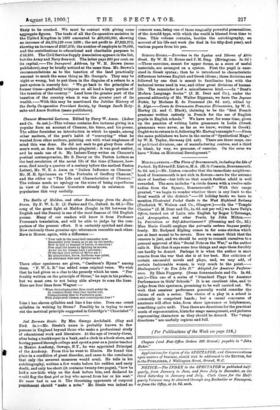The Battle of Maldon, and other Renderings from the Anglo-
Saxon. By F. W. L. B. (J. Parker and Co., Oxford. 3s. 6d.)—The song of the great fight at Maldon (fought in 991 between the English and the Danes) is one of the most famous of Old English poems. Many of our readers will know it from Professor Freeman's translation, and will be able to judge by the com- parison of the present effort. It is certainly spirited and clear. How curiously these genuine epic utterances resemble each other. Here is Homer, again, with a difference :— " Your talk in the mead-hall remember now, Remember your boasts as ye sat on the bench ; How in hall ye boasted of battle, 0 warriors Now shall the brave by fighting be known. As for me my lineage here I proclaim ; Of the race ever proud of Myrco am I ; My grandfather, know, Eadhelm was called, An alderman wise and prosperous he."
Three other specimens are given, " Caedmon's Hymn " among them. " F. W. L. B." has added some original verse. We wish that he had given us a clue to the prosody which he uses. " Pre- ferably written on the principle of Stress," he says in his preface, but we must own to not being able always to scan the lines. Here are four lines from Wagner :—
What chrr.elephantlne Zeus could nobler be In complex finish than that fateful roll, Companioning thee to Panitation goal, With sculptured themes and counterpoint free?"
Line 1 has eleven syllables and line 4 has nine. Does one count syllables in writing by Stress ? Possibly he is trying to carry out the metrical principle suggested in Coleridge's "Christabel"?


































 Previous page
Previous page